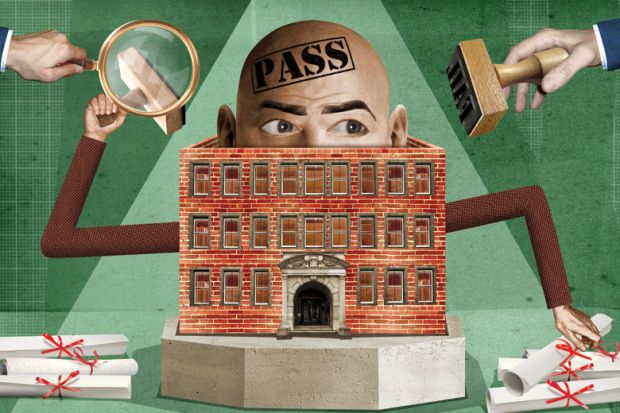The Office for Students will kill off institutional autonomy, says Geoffrey Alderman, and the sector has only itself to blame
-
By Geoffrey Alderman, June 9, 2016

The higher education bill that is now before Parliament spells the end of university self-regulation in the UK. This – and not the proposed teaching excellence framework, the canonisation of private and for-profit higher education provision or even the fast-track route to degree-awarding powers and university title – is the most fundamental of all the reforms that are about to be ramrodded through Parliament.
The bill proposes that an all-powerful Office for Students be fashioned from the ashes of the Higher Education Funding Council for England, with powers of entry that Hefce has never enjoyed. It proposes that this body will not merely be able to confer degree-awarding powers and university title, but also to take them away. And it proposes that in addition to inheriting Hefce’s statutory power to assess the quality of education in taxpayer-funded higher education institutions – meaning the totality of the student learning experience – the OfS will also take responsibility for the surveillance of academic standards – meaning (according to the bill) “the standards used by an institution to ascertain the level of achievement attained by a student undertaking a higher education course provided by it”. That is to say, the OfS – and not university senates, academic boards or even external examiners – will in future have the last word so far as the policing of these standards is concerned.
What’s more, the bill mandates the OfS to introduce “a scheme to give ratings to English higher education providers regarding the quality of, and standards applied to, the higher education that they provide”. So we can confidently expect a standards-related league table to emerge.
When the 1992 Further and Higher Education Act permitted polytechnics to turn themselves into universities, great care was taken that the funding bodies established by the legislation would be empowered – indeed obliged – to assess “the quality of education” provided in taxpayer-supported institutions. However, it was equally clear that “the arrangements” that each institution put in place for “maintaining academic standards” remained the prerogative of that institution.
It’s true that the act provided an obscure mechanism by which two or more funding bodies could be required to appoint “a person” to make what was termed “an assessment” of these arrangements. But this mechanism has never been used. Indeed, we might remind ourselves that in its proposals to the secretary of state in July 1995 on the development of quality assurance, the Committee of Vice-Chancellors and Principals – the forerunner of Universities UK – declared emphatically that “standards are in law solely the responsibility of the institutions individually”.
Historically, this privilege – to set, apply and police its own standards – has been the cornerstone of the academic autonomy enjoyed by the British higher education sector. That past, it seems, is now dead.
Whose fault is this?
Eight years ago, I delivered my inaugural professorial lecture at the University of Buckingham. Entitled “Teaching Quality Assessment, League Tables and the Decline of Academic Standards in British Higher Education”, the lecture incorporated examples of the deliberate dumbing-down of academic standards at the behest of university administrations.
One such was the celebrated case of Paul Buckland, who in 2006 resigned as professor of environmental archaeology at Bournemouth University. He did so in protest at the decision of university authorities that 14 students whom he – and a formal examinations board – had judged to have failed a course should nonetheless be deemed to have passed it. In so doing, the university authorities appear to have endorsed the view of a senior official that students should have been able to pass the course merely on the basis of lecture notes, without doing the required reading.
But I noted that the problem did not just affect the ex-polytechnics. I drew attention to the strange case of one Russell Group university where, in the autumn of 2006, it emerged that a drastic reform of the grading process had resulted in the proportion of students achieving first-class honours jumping from 7 per cent the previous year to over 17 per cent, and that it had apparently become possible for students to be awarded first-class honours without having actually achieved a first-class mark in any individual component of their degrees. I drew attention to another Russell Group institution that had appointed as sole external examiner of a master’s degree an individual who had no competence whatever in the crucial language component of this degree.
But even I was unprepared for the audacity of Manchester Metropolitan University, where, in 2009, a quite outrageous sanction – expulsion from its academic board – was apparently meted out against a teacher brave and professional enough to give damning evidence of dumbing-down to a House of Commons committee.
That committee recommended that a Quality and Standards Agency be established, with a remit to monitor academic standards. It also called for an end to the current practice of conferring degree-awarding powers in perpetuity. The government of the day inexplicably rejected these recommendations, but – in broad terms – they have now been accepted.
That is what I wanted. And that is what the sector has brought upon itself.
Geoffrey Alderman is professor of politics and contemporary history at the University of Buckingham.

0 Comments